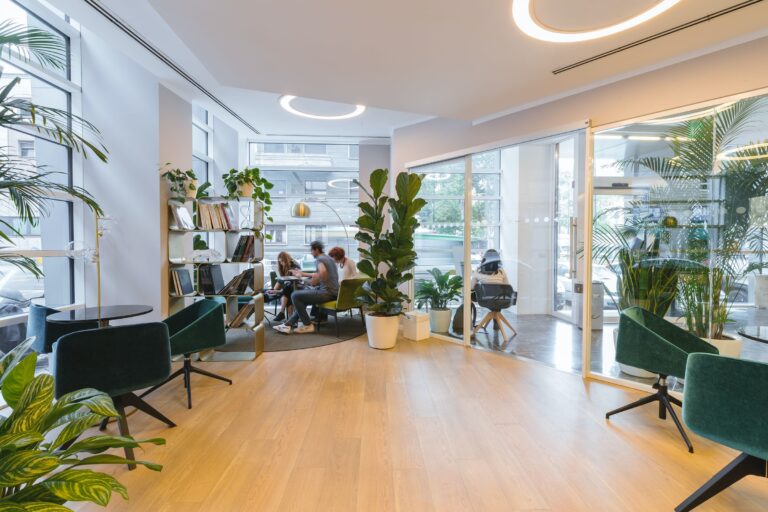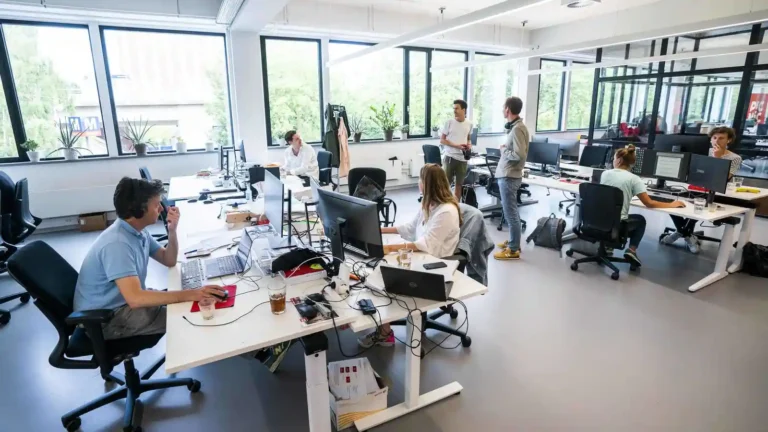What are employees looking for in 2023 - Trends that are going to rule the workplace

Introduction
As we approach the third year since the emergence of COVID-19, the virus has demonstrated a persistent effect on the future of work. When establishing strategic workforce and personnel goals for your firm, it is crucial to address the trends listed below that, include implementing hybrid working models.
"Quiet hiring" provides fresh opportunities to capture in-demand talent.
Anyone who uses LinkedIn will be familiar with the “silent quitting” headlines that went viral in the second half of 2022, which focused on workers who chose to only perform the bare minimum of their employees instead of going “above and beyond.” Organizations retain people when employees “quit resigning,” but they lose their skills and talents. Smart HR leaders will use “silent hiring” in 2023 to flip this strategy on its head and gain new skills and capabilities without employing more full-time workers. This will appear in a few crucial ways:
- A commitment to internal talent mobility to enable staff members to handle the most important tasks without changing headcount
- Opportunities for existing personnel to grow and learn while addressing changing organisational needs
- Alternative methods to flexibly bring in talent only as needed include utilising alumni networks and gig workers.
Hybrid working model
It’s important to establish appropriate flexibility for frontline workers, such as those in manufacturing and healthcare, while we move towards a more permanent period of hybrid work for desk-based professionals. In the past year, 58% of businesses that employ frontline employees have made investments to enhance the employee experience, according to the 2022 Gartner Frontline Worker Experience Reinvented Survey. A third of those who have not said they will in the upcoming 12 months.
As companies seek to provide their frontline employees with more freedom, take note that a recent Gartner poll reveals the top roles that appeal to this group:
- In charge of the work schedule
- Paid vacation
- Continuity of the work schedule
Frontline employees often exhibit interest in other forms of flexibility, like the ability to choose their projects, collaborators, and schedules.

Managers require assistance
Managers are totally out of their element due to the expectations of the modern workplace. They are under pressure from both above and below because they need to implement a corporate strategy for hybrid work while also offering purpose, flexibility, and career prospects.
Currently, low- and mid-level managers are the coworkers with whom their direct reports engage most frequently, and 60% of hybrid employees claim that their direct boss is the point of contact with the corporate culture that they have the closest.
For the majority of people, management is a talent that requires practice. Poor management has been made worse by the twin demands of remote work and the changing needs and expectations of the workforce. The greatest firms will take two crucial steps to ease management strain in 2023, including
- To address the growing managerial skills gap, offer new support and training. The strategies that worked in 2019 are inappropriate for the workforce in 2023.
- Make it clear what managers’ priorities are, how they should spend their time, and, if required, rethink their positions.
Recruitment of unconventional candidates widens talent pools
Organizations have long discussed the strategic benefits of diversifying and growing their talent pools. It’s time to follow through on those promises with deeds now. There are now two major trends:
Nonlinear career trajectories are being planned by employees: In the upcoming years, we anticipate this number to increase further. Currently, 56% of candidates report applying for employment outside of their present field of competence.
Traditional sourcing techniques and candidate pools are no longer sufficient for organisations to meet their workforce demands. Additionally, recruiting managers are less concerned today than they once were with technical expertise and industry experience.
Organizations will need to feel more at ease evaluating candidates entirely on their ability to perform in the post, rather than their qualifications and prior experience, in order to fill crucial roles in 2023. It is crucial now more than ever to challenge preconceived notions about qualifications.
Getting through pandemic trauma paves the way for long-term success
Because of the recent sociological, economic, and political unrest, the majority of people, including present and new employees, continue to struggle with pervasive mental health issues. This could lead to a drop in output and performance, as well as an increase in irate outbursts, spontaneous resignations, friction at work, and underperformance.
The majority of workers—82 per cent—say it’s critical for their organisations to view them as entire people, not just as workers. The best businesses will do the following in the upcoming year:
Instead of providing rest as a recovery strategy when both performance and emotional resilience have fallen, employers should encourage employees to take regular breaks. This might include preemptive PTO before busy work periods, no-meeting Fridays, designated wellness time, and managers set goals for how much PTO their teams will take.
- Opportunities for discussion to address issues and challenging subjects without bias or repercussions.
- On-site counselling from trauma counsellors, as well as training and coaching for managers on workplace conflict and how to have uncomfortable conversations with staff
Organizations advance DEI despite growing opposition
Some employees are displaying symptoms of resistance as firms step up their efforts in the areas of diversity, equality, and inclusion (DEI). Employees’ perceptions of their company’s DEI activities are divided, according to 42% of them. And two out of five concur that an increasing proportion of workers are becoming resentful of or alienated by their organization’s DEI initiatives.
This resistance is amplified by political and ideological movements that portray DEI as social engineering or discrimination against historically privileged groups. Pushback from employees invalidates, interrupts, or disconnects programmes designed to help marginalised populations. It may be overt or covert, planned or accidental, but frequently it is not.
Employee pushback is frequently ignored by organisations out of a concern of confirming it as legitimate, but if left unchecked, it might lower engagement and inclusiveness and ultimately lead to attrition. Smart leaders in 2023 will deal with opposition as it first arises before it develops into more disruptive forms of resistance.

Personalising employee support brings forth new data vulnerabilities.
Organisations are gathering information on employees’ health, family situations, housing conditions, mental health, and even sleep patterns utilising developing technology (AI assistants, wearables, etc.) in order to better meet their requirements.
A growing privacy crisis results from this. Leaders are unable to fully comprehend and manage how swiftly technological capabilities are increasing. Being a human organisation requires learning more about individuals, not just employees, which is a change that may compromise the confidentiality of highly personal and private data.
Employers must prioritise transparency in 2023 regarding how they gather, utilise, and keep employee data and give workers the option to stop participating in procedures they find unacceptable.
Create an employee data bill of rights to support the requirement for healthy boundaries among your staff members as well as their general well-being.
Concerns about algorithmic bias result in increased transparency in the hiring tech
New privacy requirements from the government will put pressure on businesses that utilise AI and machine learning in their hiring procedures, as well as the vendors they depend on for these services. They must be more open about their use of AI, make their data audit public, and provide staff and candidates with the option to reject AI-driven hiring and selection procedures. The ethical ramifications of these techniques for justice, diversity, inclusion, and data privacy are becoming more and more apparent as more firms start employing AI in recruiting.
Gen Z skills gaps show a decline in social skills across the profession.
Young people have been particularly hard-hit by the social isolation caused by the pandemic: The epidemic, according to 46% of Gen Z employees we recently questioned, made pursuing their educational or career aspirations more challenging, and 51% think their education has not adequately prepared them for the workforce. Gen Z has missed out on learning soft skills like negotiating, networking, speaking in front of people with confidence, and gaining the social stamina and attentiveness needed to work long hours in a physical setting.
Organisations may suffer as a result of this lack of experience and readiness, particularly if they are trying to find inexpensive staff in a competitive labour market. However, since 2020, everyone’s social skills have declined. It’s not only Gen Z. Performance suffers as a result of burnout, weariness, and career instability, all of which are exacerbated by the epidemic. To meet this issue, organisations will need to redefine professionalism for the entire workforce.

Boom in use of hybrid workplace management tools
In the next five years, the workplace is going to be more flexible with a boom in the use of hybrid workplace management tools. This will help in easing the hybrid working models. Technology is changing and the way we work is also changing. The need for new technology that can cater to all types of workplaces is on the rise. Neoffice offers the best tools for hybrid working set up including a visitor management systems, meeting room booking system, desk booking systems, hot desking, hoteling and more. This will help in easing the hybrid working models.
Neoffice Workplace Management Solution
Neoffice is built with a suite of workspace tools that help employees choose how and where they work while providing organizations with a platform to manage their hybrid workplace with ease and complete control.
The solution comes with 9 features on one single app – Team planner to manage a collaborative effort for a team, Seat Scheduling, Meeting room Booking, Hot Desking, Car park Slot Booking, Digital cafeteria to pre-order your meals at work, Employee commute solution, Survey forms. All Features are modular and the client can choose to subscribe to the relevant solution.
To know more about the solution, do drop a mail to hello@neofficesoftware.com or a call us on our Helpline +91 80 4680 5757

